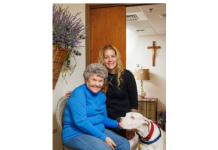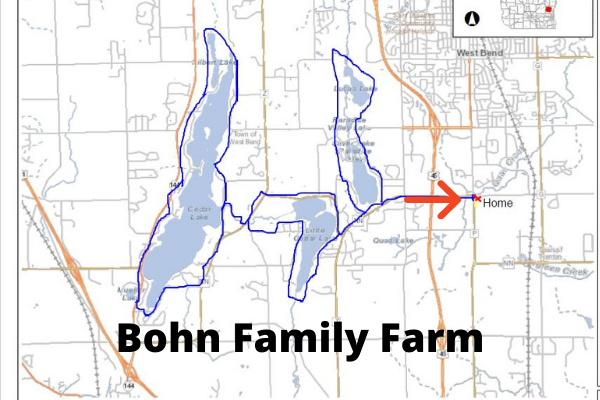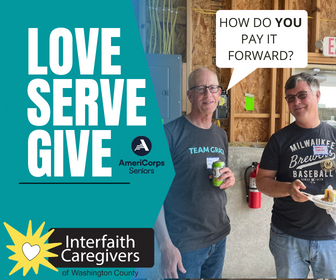West Bend, WI – Dave Bohn was born just a few months after the stock market crash; he grew up during the Great Depression in the 1930s on a farm just south of West Bend on Highway P.
In addition to having dairy cows and growing grain, his parents raised chickens, sold eggs, and for a few years, raised beef cattle. Here’s a story Dave wrote about his boyhood dog, Skippy.
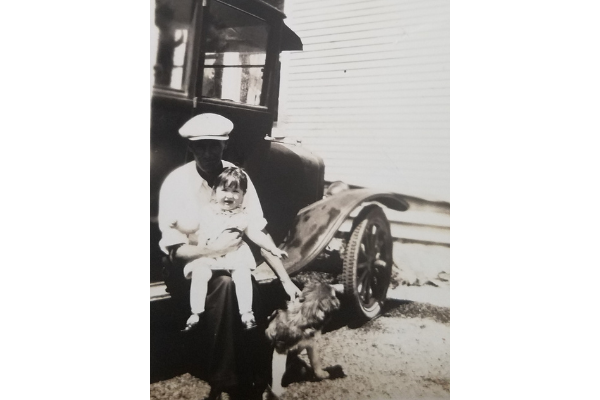
They say a dog is a man’s best friend. But, for me, a dog is a boy’s best friend. Growing up on our farm, we always had at least one dog and most of the time, we had a second hound dog for rabbit hunting. Over the years I was growing up, we had many dogs; Jack, Peggy, Mitzi, Bowser, & Spotty. My top dog, though, has always been our dog, Skippy.
Skippy was our family dog in the late 1930s and early 1940s. I think she was a Farm Shepherd, but maybe she was a mix. She had the colors of a collie but her hair was not as long, and she had ears that flopped over a bit. Skippy was sandy-colored with a white chest, a white snout, and white on her front paws. She was a medium-sized dog.
I was about 8-10 years old when we got Skippy, so my brothers and sister and I played with her a lot. She was the best dog we ever had, our best pal. She was unusual, too. When Skippy saw people getting into the car, she’d hop up onto the fender, then onto the hood, and then up onto the roof. She liked going for rides and could ride on top of our car and hold ongoing 35 mph. We had a 1935 Plymouth with a rubberized fabric roof, so Skippy could get a good hold on the roof with her claws and she wouldn’t slide off. She would go all over with us while riding on the top of our car when we were just going for a ride. My dad and mom liked to drive around the lakes once in a while (Big Cedar, Little Cedar, Silver Lake, Hackbarth Lake, and Lucas Lake) and Skippy would ride along with us. She usually didn’t come if we had a destination to go to because what would we have done with her when we got there? It wasn’t like today when people take their dogs everywhere.
Sometimes, Skippy would fall off going around a corner, but she never got hurt. She would just get right back up on top of the Plymouth and we’d all go on with the ride. It was funny when other cars would meet us while driving on the road. They would point to the top of our car and blow their horns. They thought that we didn’t know Skippy was up there and this was the first time they ever saw anything like this. It must’ve been quite a sight. Once in a while, when we had egg customers in our driveway, Skippy would hop up on the hood, and then to the roof of our customers’ cars. Needless to say, this did not go over very well with our egg customers. Luckily, that didn’t happen too often.
Skippy was quite a dog in another way. She had no fear of heights. She was good at climbing a ladder and she could even come down a ladder. She would chase after the cats all over the exposed barn beams which were about 12 feet off the floor. For a dog, this was difficult. The beams were wood and about eight inches wide. She chased the cats but she never did catch them. I don’t know if she really wanted to catch the cats or not, but she did like chasing them. This was her playtime, I guess. Skippy was a smart dog and she never did fall from the beams.
Skippy was our family dog as well. She was a real good dog. Even my mom, who didn’t like dogs in the house, would tolerate Skippy in the house. In the winter, after a cold day with us checking our traps or on a hunt, Skippy would come into the house with us to warm up. We had a wood and coal stove that stood off the kitchen floor about seven or eight inches. After these cold outings with us, she would squeeze herself under the stove to get warm. Because the heat would rise, it was warm under the stove, but not intolerable. She would stay there until she got too hot and then she’d wiggle out. She’d have to wiggle to get in and wiggle to get out.
Skippy liked to go with us wherever we went. She was a real pal for us. In the summer, if we’d go to the creek to fish, swim, or just explore, Skippy was at our side. In the fall, when we decided to go hunting, Skippy would see us getting ready and go crazy, as she wanted to come along with us. She would flush the pheasants for us. She had one bad habit, though. When she would find a dead animal in the field that was in a very smelly state, she would roll around in this dead animal. She would smell for a week until it would wear off. She was then banned from the house for quite a while.
I’m not sure if Skippy was a stray dog that just showed up at our farm or if my dad bought her from someone at the monthly Pig Fair in downtown West Bend. The Pig Fair was kind of like an expanded Farmer’s Market, with pigs and other animals being sold, in addition to produce and other farm goods. It was held once a month where the art museum is today.
But we got most of our dogs by chance. Our farm was on the main road, not too far from Milwaukee. People from the city would get little puppies for their kids. As their kids grew up, so did the puppies. When they no longer wanted a dog, many times, people would take the dog out to the farmland and turn it loose to find a home. The dog would go to the closest farm and if that farmer needed a dog, it became home for that dog. If Skippy was a stray dog, her owner must have released her near our farm and it was our luck that Skippy became our dog. My brothers and sister and I really loved Skippy.
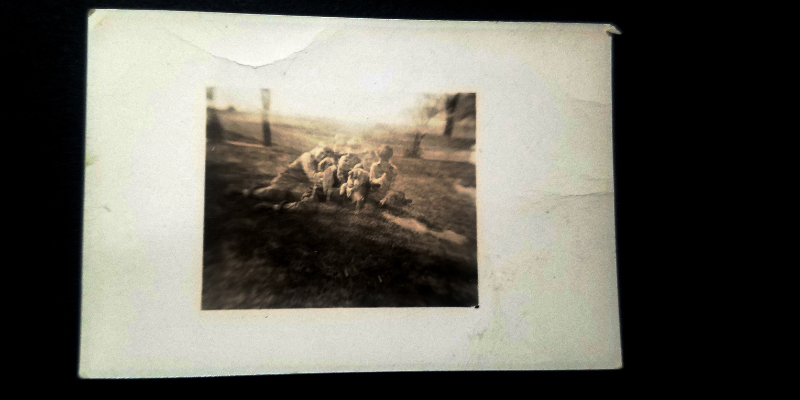
Skippy and our other dogs were farm dogs, so there was no fuss over these dogs. At that time, all farms had at least one pup, sometimes two or three. Farm dogs were free to run as they liked, never tied up or in a fenced yard. In the summer, our farm dog would sleep underneath the side porch, as there wasn’t a foundation there and the porch was raised a few feet off the ground, just enough to make a good home for a dog. In the wintertime, our farm dog would sleep in the lower barn with the cows and horses. It was the heat of the animals that kept the barn warm. The barn was never heated, but it never got too cold in there, so the dogs liked it.
Our farm dogs were good to have around because at night they would keep watch so that no one came and stole chickens from our farm. Sometimes, this did happen as chickens roost in the trees real calm and a person could just pick them up and carry them away without a sound. Our farm dog, though, would bark when a stranger came in the yard, so they were always good watchdogs. If Dad would hear our dog barking in the middle of the night, he would get up to check things out by putting on the yard light, which would scare the intruder off. This didn’t happen very often, but sometimes it did.
Some of the farm dogs were also good cow dogs. In the summertime, the cows would stay in the pasture overnight and also pretty much all day, except at milking time. The pasture was down near the swamp on our farm, a distance from the barn where they were to be milked. Good dogs got to know when it was milking time and they would automatically bring the cows back to the barn. Otherwise, someone would have to go and get the cows and bring them back to the barn for milking. Most of the time, that was the job of the kids.
Skippy is still my number one dog on my dog list. That’s why the old Red Foley song “Old Shep” really got to me. In the 1930s, there was not a Humane Society in small rural towns like West Bend. People had to treat their dogs as humanely as they could, which isn’t the way they would treat them now. “Old Shep” was about a fellow and his dog named Shep and it was one of the songs our family remembered. Shep was sick and was not going to get well again.
When I was about five or six years old, they would play the song “Old Shep” on WLS radio station out of Chicago, which my parents listened to almost all the time. WLS was also known as the Prairie Farm Station which was a station for people of the Midwest farmland. About half of the air time was filled with western and country music and the other half was filled with farm news and farm prices. Our radio was always in our kitchen, which is where we spent most of the time in our home. When the song “Old Shep” would come on the radio, my dad would have one or two of us kids sit on his lap and he would sing this song along with Red Foley. The rest of us kids would be in the kitchen too, so we got to know the song well.
After all these years, I don’t remember how most of the song went but it was about all the fun times this fellow had with his Shep. It’s the last lines of the song that I remember most. They went like this: “With trembling hands, I picked up my gun and aimed it at Shep’s faithful head. . . . Now Shep’s gone where the good doggies go and old Shep has a wonderful home.” My brothers, sister, and I would cry and cry when it got to that part. After we heard it a few times, we would start crying through the entire song.
Even as I write this, a tear comes to my eye, as this is the way Dad would do it to our dogs, too. He never would tell us they were gone. They just weren’t around anymore and we knew what had happened. I still remember sitting on Dad’s lap and crying almost 90 years ago. I hope our best pal, Skippy is with Old Shep in that place where good doggies go.






